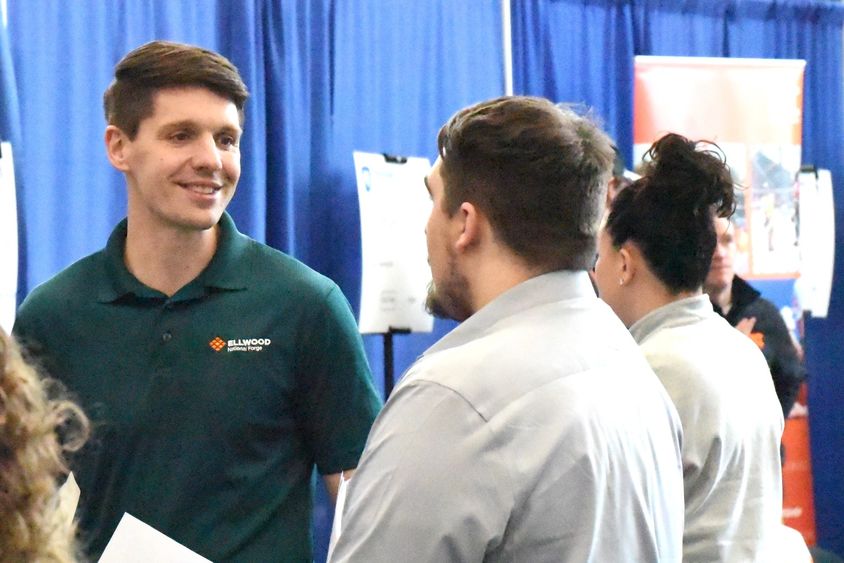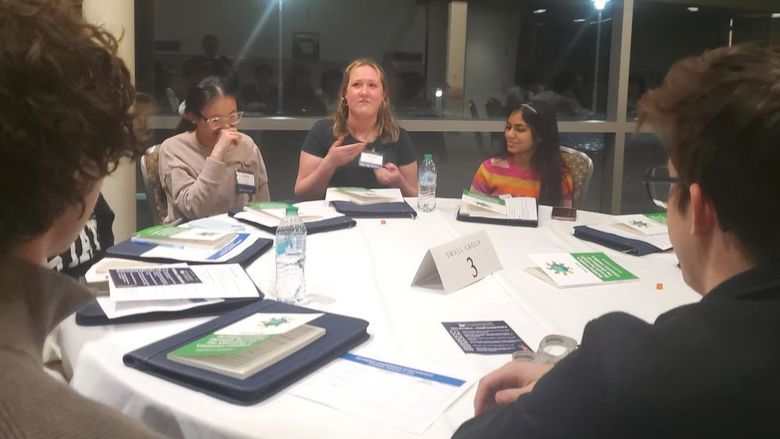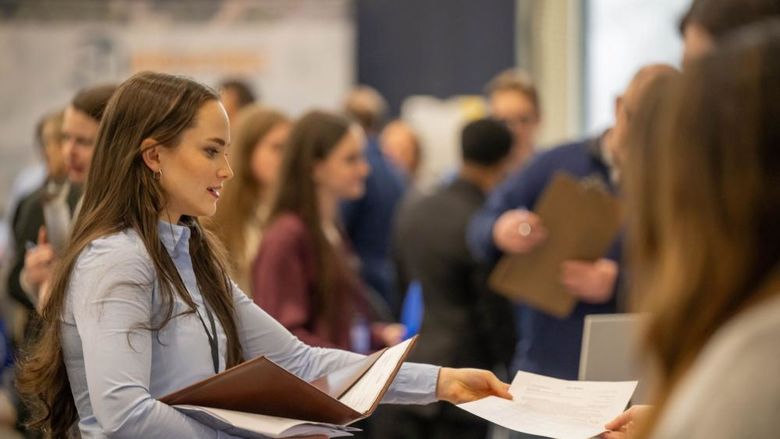
Andrew Murphy, left, a recruiter for Ellwood National Forge, talks with students at Penn State Behrend's spring Career and Internship Fair.
ERIE, Pa. — Every Ford F-150 in the United States includes a rear-wheel hub assembly that was built in Meadville.
“Every truck,” said Kristina Sanderson, a recruiter for Meadville Forging Company, which makes the parts. “We’re proud of that.”
At Penn State Behrend’s spring Career and Internship Fair, where she hoped to find a design engineer and a junior cost analyst, Sanderson talked to students about the company, which started as a small hammer shop in the 1940s. She also talked about Ford.
“That helps students understand the impact we have,” she said.
Foundries and metal-casting companies are a $74 billion industry, according to the U.S. Department of Energy. Their work, which supports the aerospace, automotive, defense and shipping industries, is expected to grow nearly 8% every year through 2030, according to DOE.
To support that growth, DOE’s Advanced Manufacturing Office partners with manufacturers, universities and national labs to address energy-related manufacturing challenges. Those challenges can be difficult for forging companies, in part because most of the businesses are small: Nearly one-quarter of all U.S. forging companies have fewer than 20 employees.
Meadville Forging is much larger, with 300 people at three sites, including computer numerical control and tool-and-die teams. But Sanderson is always looking for more employees.
“We need people, and it can be hard to find them,” she said. “We’ve had good luck at Behrend, because of the strength of the School of Engineering, so we keep coming back. We hired two full-time engineers from here in recent years.”
The college will soon provide even more support through Project RESOLVE, a 10-year regional effort to shift the region’s metal-casting, plastics and transportation industries to a circular economic model. The move will support investment by manufacturers, making companies more competitive, while also addressing plastic and waste pollution in and near the region’s freshwater resources, including Lake Erie.
“These industries provide nearly 17% of the jobs in the Erie region,” said Amy Bridger, assistant dean for innovation and corporate strategy at Behrend. “As a community, we need to protect our built-in advantage of infrastructure and workforce in this industry. Doing so now will benefit not only the industries and the people they employ, but also the broader community, which will share in the economic and environmental benefits.”
The next stage of Project RESOLVE is a planned Center for Manufacturing Competitiveness, which will be located in Behrend’s Knowledge Park. The facility will house advanced manufacturing labs where students and faculty experts will work with industry partners to develop, test and implement new technologies. The center also will feature the nation’s first full-service integrated heavy-haul battery testing facility.
That project appeals to Andrew Murphy, a recruiter for Ellwood National Forge, which operates a 2,000-ton press in Corry. He also attended Behrend’s Career and Internship Fair, where he hoped to hire process and quality control engineers.
Much of the work at Ellwood’s Corry forge supports the U.S. Department of Defense. The company builds sound-vibration assemblies for nuclear submarines. Each submarine requires 80 five-piece assemblies, Murphy said.
“I like to talk about those assemblies, because those are the parts you can pick up and look at,” he said. “Our next-lightest part weighs 250 pounds.”
Ellwood maintains a close relationship with the college. Murphy is a regular at the career fair.
“Our engineering team is almost entirely sourced from Penn State Behrend,” he said. “We need engineers who know the science but also can talk and work and innovate with others. They need to be able to apply their higher-end engineering skills to many different applications, and Behrend’s graduates can do that.”
Robb Frederick
Director of Strategic Communications, Penn State Behrend





